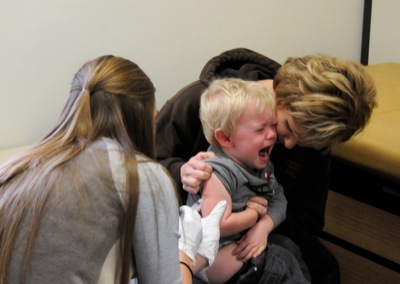Saturday, February 7th, 2015
A dose of disagreement
Two sides debate merits of mandatory vaccines
By David Giesige

Photo by David Giesige/The Daily Standard
Lisa Vondrell, a public health registered nurse, gives a vaccination to a child held by his mother. Vondrell said the Mercer County-Celina City Health Department recommends all children receive vaccinations.
Recent measles outbreaks in at least 14 states have reignited the debate over mandatory vaccinations for children.
Although Ohio has yet to confirm a case this year, local residents are taking strong stands on the issue. Supporters say immunizations are effective at preventing outbreaks and all children should be vaccinated. Opponents say the vaccine carries its own health risks.
Parents, not government, should decide whether the dangers are worth the benefit, some told the newspaper.
"The biggest reason I didn't vaccinate my kids was because of the ingredients," former Celina resident Titus Garber said.
Garber, a father of two, said he often must defend his decision not to vaccinate his children.
"People would always ask me why I made the decision not to vaccinate my kids and I would show them the ingredients and say, 'Look what's in there, that's why,' " he said.
Lisa Vondrell, a public health registered nurse for the Mercer County-Celina City Health Department, said some confusion surrounds the content of vaccines.
"There is a form of mercury in some vaccines used to maintain the potency of the vaccine but it is not lethal to humans," she said. "It's called thimerosal, which is ethyl mercury, and it's harmless to humans, but people see the word 'mercury' and assume the worst."
Garber said he also doubts the effectiveness of vaccines.
"I had three older siblings and there was me and two other siblings below. The first three were vaccinated and the last three weren't. We all still ended up getting the same diseases - measles, mumps, whooping cough, you name it. If they actually worked, I'd be all for them," Garber said.
Vondrell explained the phenomena.
"Vaccines are weakened forms of the illnesses; they are meant to protect you from. They work by helping your body build immunity to the disease. Sometimes, however, your body won't build 100 percent immunity, meaning you can still get the illness," she said.
The vaccine should at least lessen the severity of the illness in those who catch it, she said.
Some of the people opposed to mandatory vaccines don't entirely trust the medical community. Ashley Mae Sterrett, of Celina, an employee at a health department who declined to give her job title, disagrees with some material released by the medical community, especially information suggesting non-vaccinated children place vaccinated children at risk.
"The choice not to vaccinate my children is going to harm vaccinated children? That is the most ridiculous, misinformed, non-scientific, non-researched argument I have ever heard," Sterrett said. "Those are the parents who are only listening to their doctors. They're only reading the (Centers for Disease Control and Prevention) sites on vaccines. They're not getting information from anywhere else. I believe each parent should do their own research before making any decisions."
Vondrell disagreed.
"People should be getting their information from the CDC and from their doctors or from credible websites like Immunize.org. These are the experts that have access to medical journals and research. People should be careful where they get their information from. A lot of people hear about someone's personal experience and assume that's the way things are, but often these are simply outlier experiences," Vondrell explained.
Some opponents believe vaccinations can cause health issues such as a loss of motor skills or autism.
"I know a family whose kids were vaccinated and their motor skills were ruined," Garber said.
Science does not back those concerns, Vondrell said.
"There has never been any scientific evidence that shows a link to issues like autism," she said.
According to the health department, the only side effects to the measles vaccine are low-grade fever, redness and swelling, Vondrell added.
"I wouldn't inject something into a child that I wouldn't put into my own child," she said.
The health department recommends having children receive all available vaccines, Vondrell said.
Garber and Sterrett disagree.
"My kids have not been vaccinated and they are as healthy as can be. We boost their immune system with vitamins. Way too many doctors are too quick to recommend drugs. Drugs aren't all they're cracked up to be," Garber said.
"I, 100 percent believe parents should be allowed to make their own decisions," Sterrett said. "I may or may not vaccinate my third child. I am still doing the research but I can assure the community that it won't stop my child from having play dates or attending a public school."
Sarah Lewis of Celina said she supports mandatory vaccination.
"In my research, I found that 10 to 15 percent of the population has issues in their bodies that prevent them from getting immunity from immunizations. So when someone unvaccinated contracts a disease and comes in contact with those who don't have immunity, that puts those people at risk," Lewis said.
She understands vaccination carries some risk but she believes they are outweighed by the benefits.
"It's not fair to my family that our health would be put at risk because of the decision of someone else not to vaccinate their children," Lewis said.



